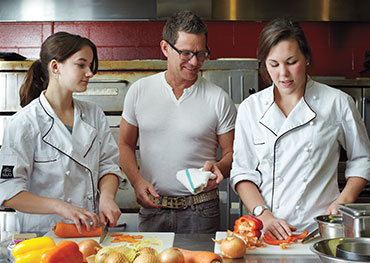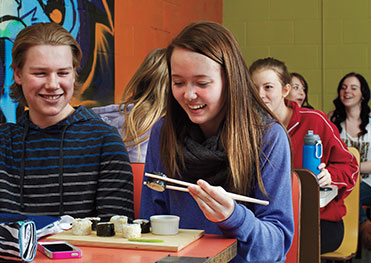
FEEDING HUNGRY MINDS
Meet Paul Finkelstein, OCT, the philosophical foodie who’s teaching students how to score big on their main course.
BY TRISH SNYDER
“Welcome to our play space,” says Paul Finkelstein, OCT, as he whirls into the kitchen at Stratford Northwestern SS where his Grade 11/12 culinary arts students chat around prep tables while they knead pizza dough and slice tomatoes. While the sound system pumps out tunes, he buzzes between workstations, pausing to coax one student to the dishwashing pit and ask another to score chicken breasts for marinating.
This class is responsible for cooking for the school’s brightly painted student-run café, the Screaming Avocado (screamingavocado.blogspot.ca). “Our goal is to introduce kids to good healthy food and teach them how to cook it,” says Finkelstein, a former professional chef, as he deposits trays of pad Thai and rotini into a chafing dish. “Feeding 200 people a day is a lofty goal but they rise to the challenge.”
Running a canteen with student-chefs isn’t a stretch for a teacher who eats challenges for breakfast. Over a dozen years, Finkelstein has helped initiate a school garden; hosted über-chefs like Michael Smith; raised thousands of dollars with collaborative student/chef dinners; led field trips to New York, Cuba and Japan; scored his classes cooking gigs for royals William and Kate; and hosted a Food Network Canada series starring his students.
Taking big risks — with supersized rewards for his students — has earned Fink, as he’s known, a Premier’s Award for Teacher of the Year in 2007–08 and a 2010–11 Prime Minister’s Award for Teaching Excellence. Just last December he was among an exclusive group of Canadians honoured for his contributions with the Queen’s Diamond Jubilee Medal. Not bad for a guy whose own high school teachers once dismissed as “silly,” “disruptive” and “not working to potential.”

Experiential learning is a big part of Finkelstein’s approach to teaching: “I give them instructions, then I give them freedom and nudge them through the process.”
Not surprisingly, the culinary arts program has become one of the school’s most popular. “Paul has created a program that’s blossomed because it’s one the kids want to be in,” says his principal, Martin Ritsma, OCT. “It’s not uncommon for me to be at a city function and be asked, ‘What’s going on at the Avocado?’ He’s created a buzz, and that’s a good thing in a school.”
Like most teachers in technological studies, Finkelstein believes in generous helpings of hands-on activities. After students scrub down and strap into aprons, he begins an afternoon class by letting them choose their tasks (“Who wants to make banana bread?”). He models new techniques and immerses himself side by side with the kids, his hands in the same dough. “Experiential learning is a big part of my philosophy,” he says. “I give them instructions, then I give them freedom and nudge them through the process.” He’d never admit it, but at least part of his success stems from his enthusiasm. “He’s passionate about kids and he’s passionate about food,” observes colleague Catherine Riddell, OCT.
This particular Tuesday, the students are using their kitchen skills to peel eggplants and chop broccoli for a five-course dinner led by chef Alain Rosica, who flew in from Rome to spend a week at Northwestern. These dinners are a popular fundraiser: people in the community pay $30 to dine on a menu planned and executed by a top chef and Finkelstein’s Culinary Club (a.k.a. The Avocados). At some point, every student will take a shift up front to practise serving from the left and talking to guests. “Kids don’t always have a good reputation for how they present themselves,” Finkelstein says. “This is a chance to develop their skills.”
Guests are a staple in Finkelstein’s kitchen. “I figure they say yes because I harass them so much,” he quips. Local farmers have preached respect for land and animals, chef-activist Joshna Maharaj cooked Indian and advocated for healthier food in hospitals, and superstar-locavore Michael Stadtländer waxed about cooking with ingredients from his 100-acre farm. “I could show these kids how to make pasta,” admits Finkelstein, “but when a chef from Italy teaches them, they’re inspired beyond belief.”
Debbie Brodie Ritz attended dinners when her son Jared was in the Culinary Club, and remembers stumbling upon him deep in discussion with three buddies. “They weren’t talking about video games or the party coming up that weekend,” remembers Brodie Ritz. “They were talking about Stadtländer’s farm-to-table philosophy and his theories about growing food organically. Paul really got those kids thinking on a more global level.”
Experiential learning is a big part of Finkelstein’s approach to teaching: “I give them instructions, then I give them freedom and nudge them through the process.”
First-class cuisine
When he’s not bringing the world to his students, Finkelstein is jetting them out to see it. Culinary Club trips have taken them to Ottawa to cook alongside the Governor General’s chef at Rideau Hall, to New York City to prepare a menu at foodie shrine James Beard House, to Italy to present at the international Terra Madre slow food conference, and to Japan for a World Expo.
Food is always on the itinerary, but these trips are about more than dicing onions. One time a flight was delayed and some students vented with increasingly foul language in the lineup. Finkelstein didn’t punish; he challenged them. “Did you notice how everyone was looking at you?” he asked them later. “People don’t talk like that in public. When problems happen, you have to learn how to deal with it.” The first time Finkelstein took a group to New York, he was relieved when his principal cautioned him against putting the students on a leash. “Give them freedom and let them grow and learn as people,” Finkelstein says. “That’s been my thing since the first trip.”

Another happy customer enjoys a nutritious and delicious lunch at the Screaming Avocado Café. Student-chefs prepared this sophisticated serving of Japanese cuisine.
The students have racked up more air miles than most through school exchanges. He’s accompanied them to British Columbia and the Northwest Territories, where they lived with families and attended the local high schools. In April 2012, the Avocados took a six-flight journey to Nunavut where they greeted their “twins” at a secondary school in Cape Dorset (they’d been connecting for weeks on Facebook). The culinary students tasted walrus stew, ice-fished for Arctic char and were stunned at the $20 price tag on a club sandwich in the town’s only restaurant. And when the Nunavut students arrived in Stratford they toured local farms and stroked cows and lambs — animals they’d only seen on TV.
These excursions would flop without Finkelstein peppering his students with regular practice and teamwork. “The collaboration skills and problem-solving they pick up as they’re figuring out a recipe or working under a chef — they’ll use those skills no matter what industry they get into,” says Deborah McNair, OCT, his principal for 10 years and now principal at St. Marys DCVI.
Sharpening life skills
If it weren’t for Finkelstein’s regime of real-life skills and dream experiences, students like Jared might still be struggling in school. Where other teachers saw a kid who couldn’t sit still, Finkelstein harnessed Jared’s energy by giving him plenty to do. “He’d say to the other teachers, ‘Listen, the more responsibility you give this kid, the better he functions,’” recalls mom Debbie Brodie Ritz. Jared went on to complete restaurant and butchery apprenticeships in Italy, and recently graduated from the Culinary Institute of Canada at Holland College in Charlottetown, PEI, where he initiated that school’s vegetable garden. “Paul took a kid who was at risk of never graduating and he gave him trust and responsibility,” she says.
When he started teaching, Finkelstein thought he’d be training chefs. Instead, he’s giving some hard-to-serve students a home and building their self-confidence through food. By teaching students to cook good healthy meals, he’s changing their families and futures. By exposing them to new flavours, they develop a palate that goes beyond frozen pizza. By introducing them to chefs and farmers, he’s changing the way they look at food. “We’re not changing society but we are changing kids and getting them to cook again.” says Finkelstein. “I see food as a tool for change.”

Paul Finkelstein admits he’s a little selfish: he takes on projects so that he can learn and grow too. Read how he turns half-baked ideas into reality.
Find a partner Whether it’s a farmer who’ll donate land or a school that wants to do an exchange, find someone you can work with.
Do your homework “Don’t tell them what you want to do, show them what you can do,” says Finkelstein. Before he walks into the admin office with a new idea, he hammers out these details:
- the main contact’s credentials
- how kids will learn from the experience
- the costs involved.
Sell the benefits Tell the administration what students will get out of it. Get the kids excited about new people and places. Remind veteran chefs that they’re influencing the next generation. That’s one reason Finkelstein’s club visits Toronto to dine at Scaramouche, one of the city’s finest restaurants. As owner-chef Keith Froggett once told Finkelstein, “If we don’t change the way this population eats, we’re out of business.”
Be committed to fundraising Raising money lets Finkelstein support community charities and pay the tab for excursions. Instead of hawking chocolate almonds, he arranges for kids to sell bags of food from local bakers, farmers and producers. Chef dinners are another fixture.
Bring in the media Tell local media what you’re doing and you’ll excite the community and other possible partners. When the Toronto Star reported on his first culinary exchange, Finkelstein stuck that article in the information package he mailed to the next school he approached. His students have been covered in dozens of blogs, newspapers and magazines like Canadian Living and Saveur.
Ticket to (free) ride
Paul Finkelstein helps pay for exchanges by tapping into funding from the YMCA Youth Exchanges Canada Program. He recommends researching a school, getting the principal on-board and then pitching the idea to the YMCA program. “If you both put in an application, it makes it easier for you to be selected and paired up,” he says. For more info, contact ymcaexchanges.org.